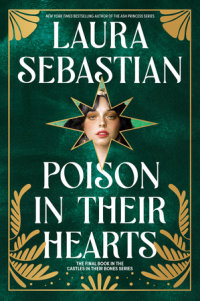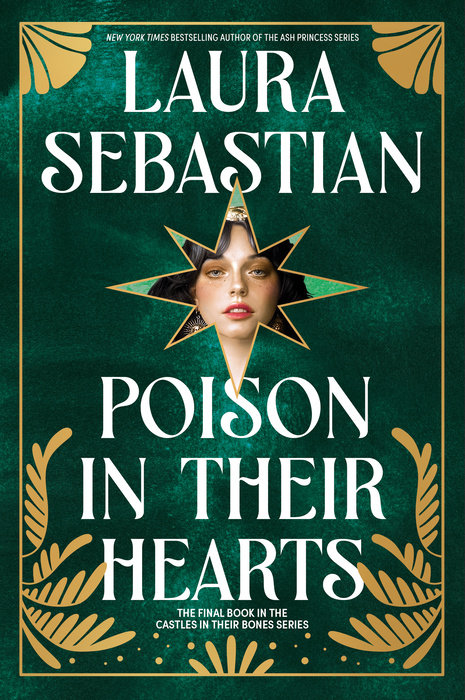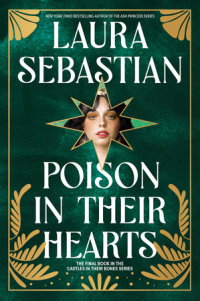Poison in Their Hearts
Poison in Their Hearts is a part of the Castles in Their Bones collection.
Immerse yourself in the final book in the epic fantasy trilogy from the author of the New York Times bestselling Ash Pricess series. Follow three princesses and the destiny they were born for: seduction, conquest, and the crown.
They were promised for marriage since birth, and raised to bring down kingdoms, but the true destiny of the triplet princesses of Bessemia has always been to die—and one of them already has. Since Sophronia’s murder, princesses Daphne and Beatriz have discovered the truth: they are pawns in their mother’s game, which will end with her as empress of not just Bessemia but the entire continent of Vesteria. Only the princesses have their own plans.
Beatriz and Daphne are still separated by a continent, and there are enemies everywhere, but now they have allies who stretch across the borders of Vesteria: Sophronia’s husband, the deposed King Leopold; Violie, a former spy for Empress Margaraux; and Beatriz’s missing husband, Pasquale, and his lover, Ambrose. Now, with their allies’ help and the magic of the stars, the princesses are ready to make their final stand.
But whispers of an ancient prophecy follow them—secrets from their past are yet to be revealed—and every move they make, the empress seems to be one step ahead them. If there’s to be any hope for the princesses, the girls will need to use every skill their mother taught them, trust in the magic in their veins, and defy fate itself. And if they can’t, all is lost for the people of Vesteria.
An Excerpt fromPoison in Their Hearts
Daphne
From where Daphne sits in the little-used parlor in the north part of Eldevale Castle, she has a perfect view of the main gate. All morning while she sips her tea, people have come and gone. A mail carriage, a produce wagon, several dozen courtiers on horseback off to shop on Wallfrost Street or hunt in the woods. Each time anyone approaches the gate, Daphne sits up straighter, but each time she slumps back again, disappointed.
“Something’s wrong,” she says aloud, stirring her tea and tearing her gaze away from the gate just long enough to glance at Cliona and Violie. The three of them have been sitting around the small table by the window since breakfast, Cliona and Violie chatting and Daphne pretending to listen. If she were less distracted, she might find herself bemused at what fast friends Cliona and Violie have become despite how different they are—Cliona the privileged Frivian lady secretly working for the rebellion her father is the head of, Violie a common-born Bessemian maid who’d been secretly working as a spy for Daphne’s mother until her allegiances changed. If Daphne were less distracted, she might even be unnerved by their friendship. After all, not long ago, Daphne considered both girls her enemies.
Not anymore, but Daphne is far more accustomed to having enemies than friends, so the adjustment is taking some time.
“That’s what I’ve been saying,” Cliona answers with a sigh. “But something tells me you aren’t talking about King Bartholomew’s plan to move the court to Notch Castle a month ahead of schedule.”
That distracts Daphne for only a second before she shakes her head. “The winter has been unseasonably warm, as I understand it. Perhaps he means to enjoy the weather better.”
She looks out the window again as two armored guards ride through the gates. Alone.
“Beatriz should have been here by now. She should have been here two days ago,” Daphne says.
It’s been a week since Daphne used stardust to speak with her sister in Bessemia, and Beatriz said she was on her way to Friv. She was taking a more circuitous path than Daphne followed when she left home to come to Friv—Beatriz had to in order to avoid their mother, who would surely be looking for her—but even allowing for delays, she should be in Friv by now.
“Any number of things could have delayed her,” Violie says, setting her teacup down. No, Daphne thinks. Not Violie. Even in her own thoughts, Daphne should think of her by the alias she’s living under, and as far as most of Friv knows, the girl sitting across from her isn’t Violie, she’s Sophronia—Daphne’s other sister, who was murdered by a mob in Temarin. Daphne needs to get used to calling her by her new name—or at least Ace, the nickname Violie had as a child that they agreed Daphne could call her to avoid suspicion—but it’s more difficult than she thought it would be. The idea of the ruse still sours Daphne’s stomach when she thinks about it, about someone else living Sophronia’s life, but it was the only way to keep Violie from being executed for attempting to murder Queen Eugenia—a murder Daphne herself ended up committing.
Daphne shakes her head. “No, I just . . . I feel it. Something is wrong.”
“Are you thinking to use stardust again to talk to her?” Cliona asks, frowning. “I can ask my father for another vial, but I think he’s getting suspicious.”
Daphne considers it for a moment. “No,” she says finally. “It’ll be the same as it’s been the last few days, and I’m not keen on facing the repercussions again.”
Every time Daphne has tried to talk to her sister via stardust, all she’s heard is an empty silence that makes her head ache like one too many glasses of ale.
Though she tries not to, Daphne can’t help but wonder if that’s what would happen if she tried to speak with Sophronia. If Beatriz has joined their sister now. The thought makes her sick.
No. Beatriz isn’t dead. She can’t be. Daphne would know if she were.
Wouldn’t she?
Daphne pushes the thought from her mind. Beatriz has always managed to take care of herself—wherever she is, whyever she’s delayed, she can handle it. In fact, Daphne thinks, she pities anyone foolish enough to try to stand in her sister’s way. She forces her gaze from the window and focuses on Cliona.
“Why would it be troubling that the court is moving to Notch Castle early?” she asks, grasping onto the distraction offered.
“Because,” Cliona says, adding another spoonful of sugar to her tea, “in the centuries-long history of the Clan Wars, Notch Castle alone remained impenetrable. Its location, in the mountains, makes for a natural defense, and everything about the castle amplifies that. If Bartholomew was anticipating an attack, that would be the smart place to be.”
Daphne considers this. Bartholomew would be right to anticipate an attack, either one of her mother’s making or one designed by Cliona’s father and his rebels. Daphne suspects the former, but she knows Cliona is more concerned by the latter. Friends they may be, but Daphne knows Cliona doesn’t tell her everything the rebels are planning. This, though, Daphne can guess at herself. With Daphne and Bairre married and public support high in their favor, the rebels have every reason to remove King Bartholomew from power, paving the way for Daphne and Bairre to eliminate the monarchy altogether from their new thrones.
“If my mother realizes I’ve turned against her,” Daphne says slowly, “there will be far worse places to be than Notch Castle.”
Cliona’s jaw tightens, and Daphne sees her mind turn. “The rebellion believes Friv is facing bigger threats than a power-hungry upstart empress,” she says finally.
“You mean your father believes that,” Daphne infers. Cliona’s father, Lord Panlington, is King Bartholomew’s closest friend, but he’s also been working to dethrone him for the last two decades. When Cliona doesn’t protest, Daphne looks to Violie for support—after all, few people know what the empress is capable of better than Violie, who worked as one of her spies until recently—but Violie is distracted, gazing out the window with a furrowed brow.
Heart leaping, Daphne follows her gaze, but just as quickly her heart sinks again, leaving dread in its wake.
A single rider on a pure white horse pulls to a stop at the gate, but it’s his livery that gives Daphne pause. He’s dressed head to toe in Bessemian blue.
“Your mother’s sent a letter?” Violie asks.
“A letter would come in the post,” Daphne says, setting her teacup down and getting to her feet. She can think of very few things that would entice her mother to send her personal messenger to Friv, and none of them are good.
Daphne and Cliona make their way to the entry hall without Violie in case the messenger is someone who might have seen Sophronia before and recognize that Violie isn’t her. As soon as they reach the castle’s ground floor, they meet Bairre, flanked by two guards, coming from the entry hall. When his eyes meet Daphne’s, she knows that whatever he has to say is bad.
“My mother sent a messenger,” she says, so he doesn’t have to. “We saw him come through the gates.”
Bairre nods. “He said he would only speak to you and Sophronia,” he tells her.
Daphne’s stomach sinks and she spares a glance at the guards accompanying him. “I’ll speak to him, but my sister is feeling indisposed. I’d rather not disturb her.”
Bairre nods, understanding her meaning. As he leads her through the hall to the entry, she glances sideways at him.
It’s been a week since they were married, but she still has difficulty thinking of him as her husband, difficulty thinking of herself as someone’s wife. Perhaps that is, at least in part, because the marriage hasn’t been consummated.
It was an agreement they came to on their wedding night, a protective measure to use to dissolve their marriage if the empress tries to turn it into a weapon against them.
“If she’s received word Sophronia is alive, she’ll want to verify that,” Daphne says. “Of course, we expected as much, didn’t we?”
Bairre gives a terse nod, but neither of them says that so much of their plan hinges on chance. And it will be a lot easier if the messenger is one Daphne doesn’t recognize, one who is unlikely to recognize that Violie isn’t, in fact, Sophronia.
Any hope of that, though, is dashed as soon as Daphne steps into the entry hall, finding herself face to face with Bertrand, a man who has been in her mother’s service for as long as Daphne can remember.
“Your Highness,” Bertrand says, bowing deeply.
“Bertrand,” Daphne replies with a smile, leaving Bairre’s side to step toward him, extending her hands to take his, like she’s greeting an old friend. “How good to see you again.”
“And you as well, Princess Daphne,” Bertrand says, squeezing her hands before releasing them. He glances over her shoulder, but when he sees only Bairre, Cliona, and the guards accompanying her, he frowns. “Is Princess Sophronia not with you?” he asks.
“Queen Sophronia isn’t feeling well,” Daphne says. “I’m sure she’ll be terribly disappointed to miss you, but the . . . trauma of escaping Temarin and all that passed since has taken its toll on her, I’m afraid. I’m loath to interrupt her rest for any reason. You understand, I’m sure.”
Daphne punctuates those last words with another squeeze of his hands, this time pricking his skin with her poison ring.
“Oh,” Bertrand says, jumping and pulling his hands out of Daphne’s. She frowns.
“Are you all right, Bertrand?” she asks, all wide-eyed worry. “You look exhausted—unsurprising, since you’ve had quite a journey.”
Bertrand shakes his head, like he’s trying to clear it. When he looks back at Daphne, his eyes have gone glassy and unfocused. “Exhausted,” he echoes. “Quite a journey.”
Aetherleaf powder leaves its victims drowsy and suggestible, precisely how Daphne needs him for her plan to work.
“I thought as much,” Daphne says with a sympathetic smile. “Why don’t you rest up for a bit? Perhaps Sophronia will be well enough to say hello at supper.”
“Supper,” Bertrand says.
“Yes, exactly,” Daphne says, glancing up at Bairre and giving him a small, triumphant smile. “Come, I’ll show you to a guest room.”
As Daphne escorts Bertrand down the hall, giving no outward indication of exactly how much weight he is putting on her arm, she monitors his steps, the rate of his breathing, and the speed of his motions. When she’s satisfied the drug has fully taken hold of him, she glances over her shoulder to ensure that Bairre and Cliona are keeping the guards at a safe distance. Satisfied, she begins to speak in Bertrand’s ear, her voice low and soft.
“You enjoyed a lovely dinner with Queen Sophronia and me. Didn’t you think she looked well?”
“She looked well,” Bertrand echoes, nodding his head.
“She was so thrilled to see you, Bertrand. She asked after your wife and son back in Bessemia and you had a lovely conversation about them. Sophronia is always so thoughtful that way, isn’t she?”
“Thoughtful, yes,” he says.
“But you had far too much to drink at dinner. It’s a bit embarrassing how in your cups you became—when you wake up in the morning you’ll be anxious to leave the castle at once to return to the empress.”
“Return to the empress.”
“And when you see her, you’ll tell her how you saw Sophronia, how well she looked, how you spoke with her and she was just as you remembered her. Can you do that?”
“Can do that.”
“Tell me, then,” Daphne says. “What will you tell my mother?”
“I saw Queen Sophronia,” he says, his voice drowsy but the words clear. “She looked well, we spoke and she was just as I remembered her.”
“Very good, Bertrand,” Daphne says.
He is leaning too heavily on her now, all but dragging her to the stone floor.
“Guards,” Daphne says over her shoulder. “I fear Bertrand had a bit too much to drink on his journey. Will you help him to bed before he hurts himself?”
“Of course, Princess,” one guard says, sweeping forward to relieve her of her burden.



